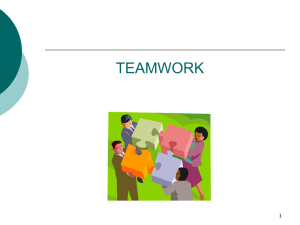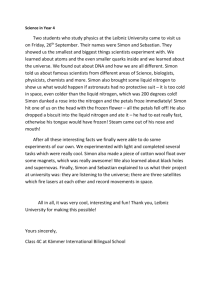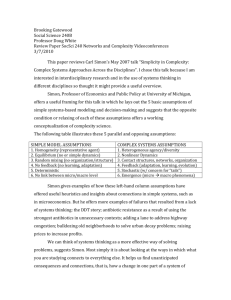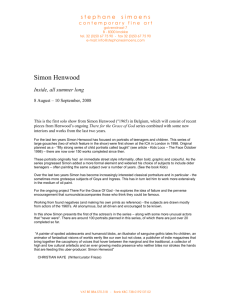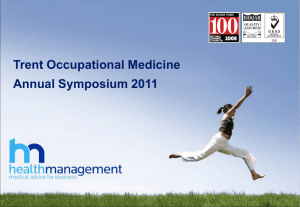Healthcare Careers, Qualities & Teamwork Presentation
advertisement
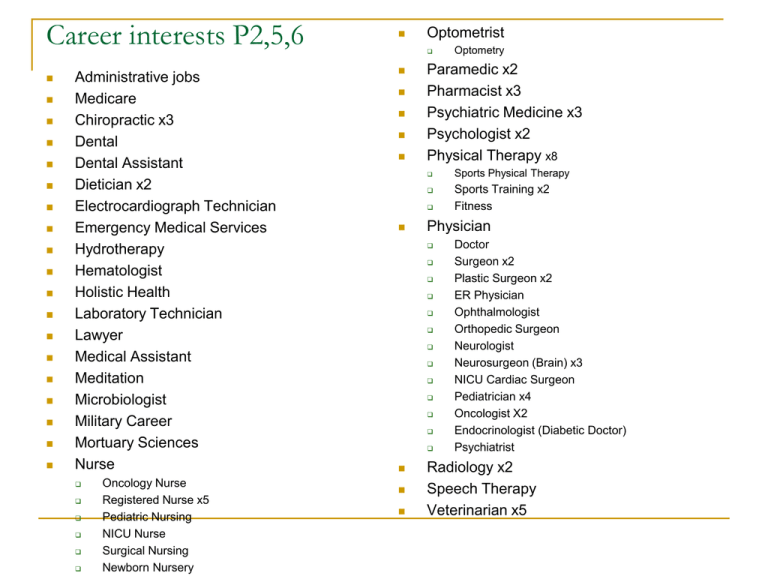
Career interests P2,5,6 Administrative jobs Medicare Chiropractic x3 Dental Dental Assistant Dietician x2 Electrocardiograph Technician Emergency Medical Services Hydrotherapy Hematologist Holistic Health Laboratory Technician Lawyer Medical Assistant Meditation Microbiologist Military Career Mortuary Sciences Nurse Oncology Nurse Registered Nurse x5 Pediatric Nursing NICU Nurse Surgical Nursing Newborn Nursery Optometrist Paramedic x2 Pharmacist x3 Psychiatric Medicine x3 Psychologist x2 Physical Therapy x8 Sports Physical Therapy Sports Training x2 Fitness Physician Optometry Doctor Surgeon x2 Plastic Surgeon x2 ER Physician Ophthalmologist Orthopedic Surgeon Neurologist Neurosurgeon (Brain) x3 NICU Cardiac Surgeon Pediatrician x4 Oncologist X2 Endocrinologist (Diabetic Doctor) Psychiatrist Radiology x2 Speech Therapy Veterinarian x5 Personal Qualities of a Health Care Worker Unit 3 Personal and Professional Characteristics Certain personal attitudes, values, and rules of appearance apply to all health care professions. It is an appearance that inspires confidence and a positive self-image. Personal and Professional Characteristics Research shows that within twenty seconds to 4 minutes people form an impression about a person based on their appearance. 5 Factors That Contribute to Good Health Health care professionals promote health and disease prevention. A health care worker should present a healthy appearance. Diet Rest Exercise Good Posture Avoid tobacco, alcohol, and drugs Personal Appearance In health care it is importance to have a clean, neat and professional appearance. Know what is rules are established at your place of employment. Who are these guys? Professional Appearance Uniforms Clothing Name Badge Shoes Personal hygiene Nails Hair Jewelry Make up Personal Characteristics Many personal/professional characteristics and attitudes are required in health occupations. Make every effort to develop the following characteristics and incorporate them into your personality. Personal Characteristics Empathy – being able to understand another persons feelings, situation, and motives Personal Characteristics Honesty – truthfulness and integrity are important in any career Personal Characteristics Dependability – employers and patients rely on you, so you must accept responsibility by being prompt to work and doing your job accurately and timely Personal Characteristics Willingness to learn – You must be willing to adapt to change. Change often requires learning new techniques or procedures. Personal Characteristics Patience – tolerant and understanding Acceptance of Criticism – criticism can be constructive and allow you to improve your work Personal Characteristics Enthusiasm – enjoy your work and display a positive attitude Self-motivated – ability to begin and follow through on a task. Set goals and work to attain them Personal Characteristics Tact – the ability to do and say the kindest and most fitting thing in a difficult situation. Competence – you are qualified and capable to perform a task. Personal Characteristics Responsibility – willing to be held accountable for your actions. Discretion – use good judgment in what you say or do. Confidentiality is important. Team Player – learn to work well with others. Working together can accomplish a goal much faster than individually. Bell 9/19 WHO AM I? Everyday this person scored himself on 13 different virtues (A virtue is a positive trait or quality, moral excellence) including sincerity, justice, moderation, silence, humility, tranquility, etc. He stated: “though I never arrived at the perfection I had been so ambitious to obtaining, but fell far short of it, yet as I was, by the endeavor, a better and happier man than I otherwise should have been had I not attempted it.” Virtues Teamwork Teamwork consists of many professionals, with different levels of educations, ideas, backgrounds, and interests, working together for the benefit of the patient. Teamwork improves communication and continuity of care. A leader is an important part of every team. Good interpersonal relationships are essential. The “Golden Rule” (treat others as you would want to be treated) should be the main rule of team work. Teamwork Teamwork2 The Golden Rules of Teamwork 1. Help each other to be RIGHT - not wrong. 2. Look for ways to make New ideas work - not for reasons why they will not work. 3. If in doubt - Check it Out. Don't make negative assumptions about one another. 4. Help each other Win and take pride in each other's successes. US, WE, OUR, TOGETHER, not they, them, their, those guys. 5. Speak Positively about each other, help those who make mistakes learn. 6. Maintain a positive attitude. Work to improve the situation no matter what that situation is. 7. Act with initiative and courage as if everyone depends on you. 8. Do everything with Enthusiasm for nothing is as contagious as success. 9. Whenever you can remember to Give things away rather than take them away: Give Respect, Recognition, Power, Support, Compassion, Help. 10. Never give up. Professional Leadership Leadership The skill or ability to encourage people to work together and do their best to achieve common goals. A leader is defined as an individual who leads or guides others, or who is in charge to command others. In a group, every member who makes a contribution to an idea can be considered a leader. Leadership in a group passes from person to person as each individual contributes to the group’s goal. Professional Leadership Leaders are frequently classified as one of three types based on how they perform their leadership skills. Democratic leader – encourages the participation of all individuals in decisions. Listens to others opinions. Laissez-faire leader – informal type of leader, will have minimal rules, group functions with little or no direction. Autocratic – often called a dictator, maintains total rule, makes all decisions. Bell work 09/21 Recall the leadership styles we discussed yesterday. Are you a leader? What type are you? Show your leadership and teamwork Simon Says Everyone must do whatever Simon says, as long as Simon prefaces his or her request with the phrase, "Simon says ..." So "Simon says, stand on one foot" must be complied with, but "Jump up and down" should not. Anyone who compiles at the wrong time is out. Last one in the game wins -- and, if you're willing to risk it, becomes the next Simon. Red Light, Green Light You're in the middle, with your back to a lineup of panting kids. At "Green Light!" they'll creep/walk/run toward you -until you spin and holler "Red Light." Anyone who doesn't instantly freeze is sent back to Start. First to touch you switches places. Stress Working in health care can be very stressful. Sometimes you will deal with life and death situations. How do you handle stress? Stress Stress is the body’s reaction to any stimulus that requires a person to adjust to a changing environment. Change always initiates stress. The stimuli (an event) to change, alter behavior, or adapt to a situation are stressors. Stress Stressors can be caused by internal or external forces. Internal stress – “heart attack,” cancer External stress – new job, marriage, divorce, test. No matter what the cause, a stressor will cause the body to go into alarm or warning mode…..the “fight or flight” response. The sympathetic nervous system prepares the body for action by releasing the hormone adrenaline into the blood stream. Stress Not all stress is harmful. A small amount of stress is essential to an individual’s well-being because it makes the person more alert and raises the energy level. Stress can cause positive feelings such as excitement, anticipation, self-confidence, and a sense of achievement. Stress – How can you handle it? Stop: immediately stop what you are doing to break out of the stress response. Breathe: take a slow deep breath to relieve the physical tension. Reflect: think about the problem and the cause of the stress. Choose: determine how you want to deal with the stress.
